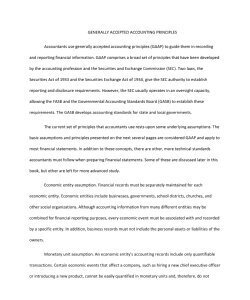GENERALLY ACCEPTED ACCOUNTING PRINCIPLES Accountants use generally accepted accounting principles (GAAP) to guide them in recording and reporting financial information. GAAP comprises a broad set of p
GENERALLY ACCEPTED ACCOUNTING PRINCIPLES Accountants use generally accepted accounting principles (GAAP) to guide them in recording and reporting financial information. GAAP comprises a broad set of p
GENERALLY ACCEPTED ACCOUNTING PRINCIPLES
Accountants use generally accepted accounting principles (GAAP) to guide them in recording and reporting financial information. GAAP comprises a broad set of principles that have been developed by the accounting profession and the Securities and Exchange Commission (SEC). Two laws, the Securities Act of 1933 and the Securities Exchange Act of 1934, give the SEC authority to establish reporting and disclosure requirements. However, the SEC usually operates in an oversight capacity, allowing the FASB and the Governmental Accounting Standards Board (GASB) to establish these requirements. The GASB develops accounting standards for state and local governments.
The current set of principles that accountants use rests upon some underlying assumptions. The basic assumptions and principles presented on the next several pages are considered GAAP and apply to most financial statements. In addition to these concepts, there are other, more technical standards
